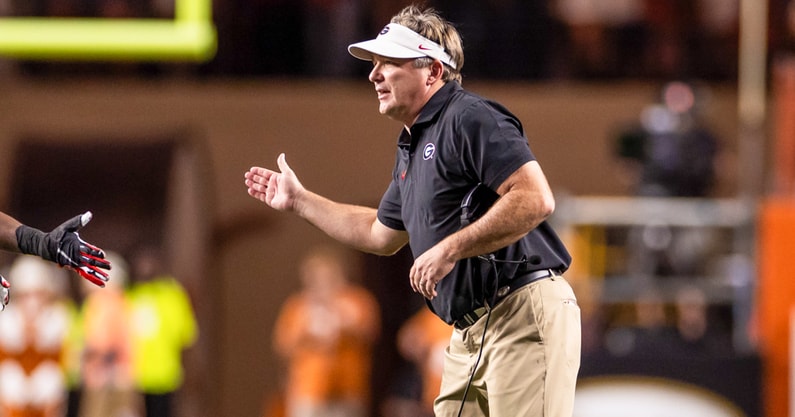Georgia vs. Texas: The Recruiting War That Could Redefine the SEC for Years to Come
College football has always been defined by rivalries, but in the modern era, where recruiting is the lifeblood of championships, the fiercest battles often unfold long before players take the field. And right now, a new war is raging, one that’s shaking the foundation of the Southeastern Conference and sending ripples across the national landscape: Georgia and Texas are locked in a recruiting rivalry that promises to shape the future of the sport. It’s a clash of cultures, resources, and philosophies, and its outcome could determine who sits on the SEC throne in the years ahead.
To understand why this showdown matters so much, consider the power dynamics at play. For the past several seasons, Georgia has not just been dominant—they’ve been the standard. Under Kirby Smart, the Bulldogs have constructed a recruiting machine that churns out top-ranked classes year after year, stockpiling elite talent at a rate few programs in history can match. Back-to-back national titles solidified their supremacy, and their ability to reload rather than rebuild made them the model every program envied. Georgia became the gravitational force in college football, pulling the game’s brightest stars to Athens with promises of championships, NFL development, and a culture built on relentless competition.
Enter Texas, the program that for years carried the burden of unfulfilled expectations. The Longhorns, with their brand power, deep-pocketed boosters, and access to one of the richest recruiting territories in the nation, have always had the tools to compete with the elite. But for over a decade, results lagged behind resources. Coaching changes, inconsistent development, and missed evaluations fueled the narrative that Texas was a sleeping giant, a program living on past glory rather than present dominance. That narrative, however, is beginning to erode, and the reason is simple: Texas is winning battles it used to lose—and not just any battles, but head-to-head wars against Georgia for the sport’s most coveted prospects.
This is not about a single five-star flipping late in the cycle or a surprise commitment that stuns recruiting analysts for a week. This is about a pattern emerging, one that suggests Texas is no longer content to dominate its own backyard. The Longhorns are storming into SEC territory and pulling talent away from the very program that has defined the league’s modern era. And in doing so, they’re announcing something far bigger than a class ranking—they’re signaling intent. Texas isn’t joining the SEC to blend in. It’s coming to take its place among the giants, and it’s doing so by beating those giants at their own game.
What makes this rivalry so fascinating is that it represents more than just a football tug-of-war. It’s a clash of recruiting philosophies. Georgia thrives on its reputation for development and winning, its ability to point to a conveyor belt of NFL draft picks and national titles as proof of concept. Their pitch is grounded in a system that feels inevitable: come here, compete against the best, and become the best. Texas, meanwhile, leans on a different but equally compelling formula. They offer a blend of tradition and modernity—a program with historic cachet now armed with SEC exposure and a forward-thinking approach to player branding through NIL opportunities. In an era where recruits weigh financial opportunities alongside football futures, Texas has built an infrastructure that turns potential into tangible value before a player even takes a snap.
Coaches won’t say it outright, but make no mistake: these wins and losses on the trail carry emotional weight. For Georgia, every lost recruit chips away at the aura of inevitability they’ve worked so hard to cultivate. For Texas, every head-to-head victory validates the massive investment the program has made—not just in facilities and NIL collectives, but in creating a culture that can compete with the sport’s heavyweights. This isn’t just about adding stars to a roster. It’s about perception, momentum, and the psychological edge that comes from proving you can go toe-to-toe with the best and come out on top.
The timing of this rivalry’s emergence adds another layer of intrigue. Texas is stepping into the SEC at a moment when the conference feels as competitive as ever. Alabama remains a powerhouse, even as Nick Saban navigates the twilight of a legendary career. LSU is surging under Brian Kelly. Programs like Tennessee and Florida are desperate to reassert themselves as national players. Against that backdrop, Georgia has been the immovable object, the dynasty in mid-stride, collecting rings and blue-chip talent with equal ease. For Texas to make noise in that environment, it can’t afford incremental gains—it needs statement victories. And nothing screams louder than prying a prized recruit away from Athens.
Fans, of course, are eating this up. Every commitment sparks online battles, every flip sets message boards ablaze, and every whispered rumor about a top prospect choosing Austin over Athens feels like a tectonic shift to those invested in the sport’s future. But beyond the fanfare lies the real stakes: rosters win games, and sustained recruiting momentum builds dynasties. If Texas continues to string together classes that rank among the nation’s best—and if those classes come at Georgia’s expense—the SEC power map could look very different in five years.
That said, it would be foolish to underestimate Georgia. Programs of that caliber don’t simply surrender their crown without a fight. Expect Kirby Smart and his staff to respond with the kind of intensity that has defined their rise. This is not a program accustomed to losing, especially on the recruiting trail. If anything, the Bulldogs will view these Texas wins as a challenge, a call to arms that will push them to double down on the very approach that has made them the sport’s modern juggernaut. That’s what makes this rivalry so compelling—it’s not one-sided, and it’s not fleeting. It’s a collision course between two titans, one defending its empire and the other building its own.
The assistant coaches, analysts, and insiders who live and breathe this world know that recruiting wars aren’t won in a day or even in a cycle. They’re battles of endurance, of adaptability, of building relationships that withstand the turbulence of NIL negotiations and transfer portal temptations. They’re also battles of vision—convincing not just players but their families that your program represents the best possible future. In that sense, Texas vs. Georgia is more than a headline—it’s a case study in how college football’s balance of power evolves.
So what does this mean for the SEC as a whole? For starters, it means the league’s internal arms race just intensified. Alabama and LSU won’t sit idle while Georgia and Texas carve out headlines. Florida, Tennessee, and Texas A&M will double down on their own efforts to keep pace. The ripple effects could redefine not just recruiting rankings but the competitive equilibrium of the entire conference. And nationally, it raises the question: if Texas can consistently win these battles, what’s to stop them from becoming the next dynasty? The resources are there. The brand is there. The will appears to be there. All that remains is proving it on the field.
Until then, this rivalry will rage in living rooms, high school gyms, and recruiting visits across the South. It will play out in Instagram posts and commitment ceremonies, in whispers and rumors and the sudden shockwaves of breaking news. It will captivate fans because it represents more than competition—it represents the future. A future where the SEC isn’t just the deepest conference in football but the stage for its most dramatic storyline: Georgia and Texas, locked in a struggle for supremacy that could define the next decade.
The stakes could not be higher, and the drama could not be richer. Because in college football, recruiting isn’t just the beginning—it’s everything. And right now, Texas and Georgia are writing a chapter that fans will be talking about for years.


